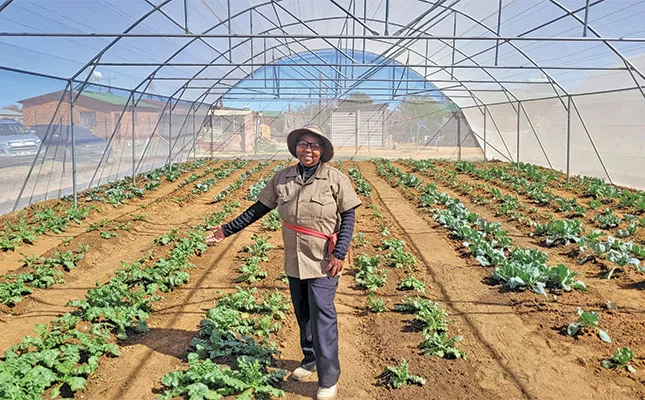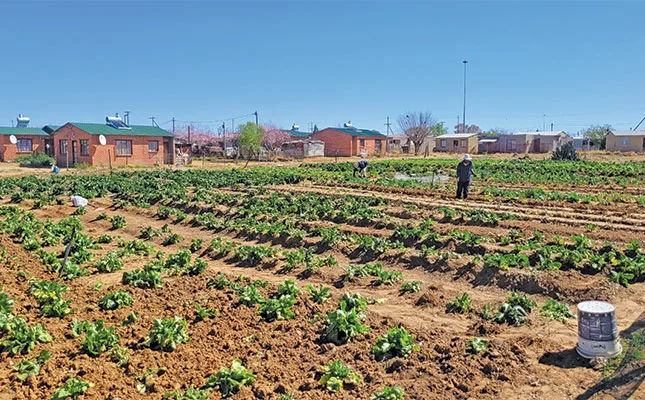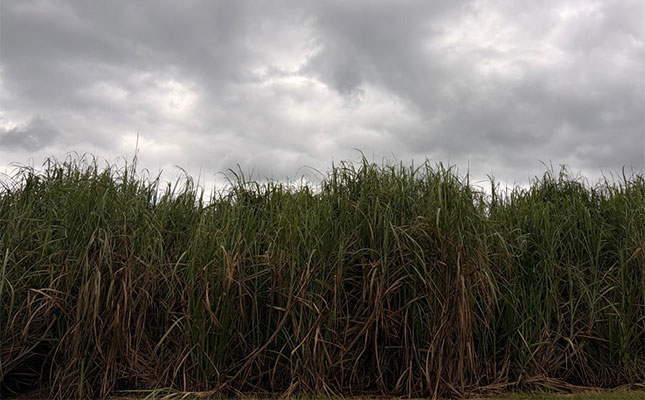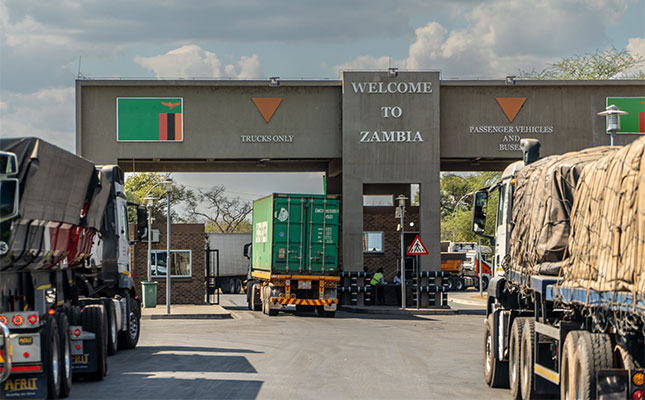
Standing alongside Mathabang Lekhula-Legula on her 0,5ha vegetable farm in Welkom, Free State, it’s hard to believe that the neatly lined rows of spinach, cabbage and onions were once nothing but a heap of rubbish.
The land she farms used to be an open field that served as a dumping ground. The rubbish piled so high that neighbouring houses were hidden from sight.
READ From backyard to business: Patricia Beleng’s journey to success
The smell, the flies, and the constant growth of the heap was an eyesore and health hazard to the community. But today the land is a productive vegetable farm that feeds schools, funeral parlours, and households in Welkom, providing employment for 11 people, and mentorship to the youth.
Industrious farmer
At the helm is Lekhula-Legula, an industrious farmer who does not let opportunity pass her by. She grew up in Sterkspruit in the Eastern Cape, where she farmed with her father from the age of 12, tending to cattle and planting tomatoes, beans and cabbage.
Later, when she got married and moved to Welkom, where her husband worked on the mines, she couldn’t ignore the lure of agriculture.
She started with a small backyard garden, planting spinach. Word spread quickly, and neighbours began lining up to buy from her.
“I realised there was much more demand than I could supply, and I needed to expand. I knew that the dumping site would be ideal since it would also solve the issue of the growing pile of rubbish,” she says.
Lekhula-Legula received permission to occupy the site from the local municipality and set about clearing the land. This needed to be done by hand, and she roped in the unemployed in the community to help her.
Resourceful and innovative
Today, Lekhula-Legula’s farm produces a steady supply of vegetables throughout the year. In summer, she plants pumpkins, potatoes and spinach. Winter brings spinach, onions and cabbage.
To keep production costs down, she grows her own seedlings, which not only saves money but has become a small business of its own.
“I make seedlings for myself, so I thought I might as well make enough to sell to the community too,” she explains.
“Now families can plant spinach in their own backyards.”
Her approach is resourceful and innovative. Fertiliser from the Department of Agriculture is mixed with water for fertigation, while pig manure is added to the sandy soil to improve fertility and structure. Everything on the farm is done by hand, from preparing the land with pitchforks, to irrigating with watering cans.
READ The nurse who became an award-winning vegetable producer
For pest control, she uses an organic mixture of raw chillies, chilli powder, garlic and dishwashing liquid.
“It’s very strong, so it has to be cooked outside. It is very effective and means I don’t need to use chemicals, which can be pricey.”
Her biggest challenge is irrigation. At present, water is applied by hand, which is time-consuming. Assistance from Harmony Gold Mining Company will soon see an irrigation system installed.
In June this year, the mine erected two net houses on the farm, which reduces crop damage from adverse weather like frost and heatwaves.
Partnerships that drive growth
It is Lekhula-Legula’s determination and work ethic that has attracted support from key partners who recognise her hard work. Last year she was accepted into the Standard Bank Kopano Central Business Development programme, where she not only received training, but financial assistance that gave her business a boost.
“I learnt how to build relationships with clients, how to market my business, and how to deal with different stakeholders.
“Graduating from the programme was a big moment. I thought to myself, ‘now I’m really in business’,” she says with a smile.
Standard Bank also provided practical support; a billboard outside her farm that doubles as advertising, makes her operation visible to the community and attracts new business. She was also able to buy equipment for processing vegetables, opening up an entirely new market.
“When there are big events like weddings, funerals or school functions, people want vegetables that are already chopped and prepared,” Lekhula-Legula explains.
“With the knives, chopping boards and washing containers I purchased, I can process vegetables. Because the produce is prepared, I can sell it at a higher price.”
Work goes beyond her own fields. She is passionate about instilling the same love for farming in the youth in her community, passing on the skills she has learnt in the Kopano programme.
“At first, many of the youth were not interested, but once I showed them how much money they can make just by planting and harvesting spinach, they changed their minds.”
Lekhula-Legula has formed a youth co-operative where she teaches youngsters to farm, and the produce is pooled together for marketing. She mentors students in every aspect of farming, from producing seedlings to planting, irrigating, harvesting, and even processing.

A dream for the future
“If I help one person in a day, I feel proud. I know I’ve put food on the table and taught them a new skill,” she says.
While vegetables remain the backbone of her enterprise, Lekhula-Legula also plants sunflowers and soya beans in rotation on 60ha of land near Hennenman. Here, the challenges are greater as she doesn’t yet own her own equipment and must hire tractors for planting, spraying and harvesting.
This often leads to delays because multiple farmers share the same machinery, reducing yields and crop quality.
“This year I planted sunflowers much later than what is ideal, and when the heavy rains came, the plants struggled to cope. With crops like sunflowers and soya beans, timing is everything. If you miss the window, you lose yield. My dream is to become an export farmer, sending my soya beans as far as China.”
For now, Lekhula-Legula plans to extend her vegetable farm further across the remaining portions of the dump site that still await transformation.
“The demand is there,” she says. “Every afternoon, many people come to buy vegetables, so I know that if I expand, I will be able to sell everything.”
What was once an ugly, foul-smelling dumping ground is today a source of pride, nourishment, and opportunity for Lekhula-Legula’s community.
For more information visit standardbank.co.za.
Get trusted farming news from Farmers Weekly in Google Top Stories.
➕ Add Farmers Weekly to Google ✔ Takes 10 seconds · ✔ Remove anytime






